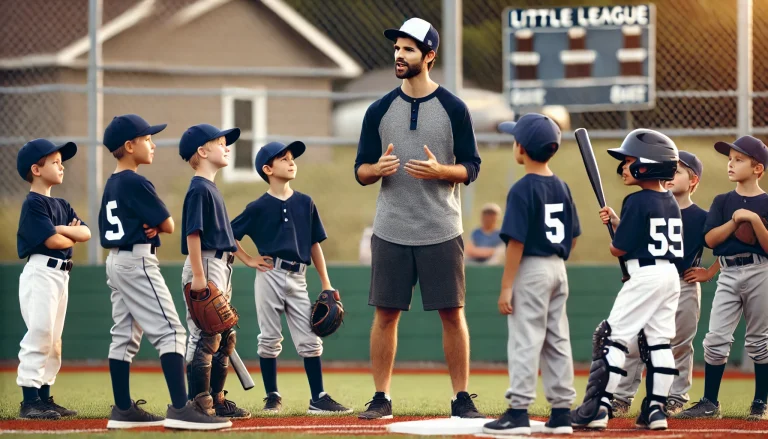What Are the 10 Commandments for Little League Coaches?
Coaching Little League isn’t always easy—it takes patience, dedication, and the ability to connect with kids just beginning to discover their potential.
But here’s the good news: you don’t need to have all the answers on day one.
In this blog, you’ll find 10 guiding principles to help you navigate the ups and downs of coaching while fostering an environment where every player can grow, learn, and thrive.
At the end of the day, Little League isn’t about the scoreboard—it’s about shaping young players and making a lasting impact on their lives.
Whether you’re a first-time coach or a seasoned veteran looking for a refresher, these principles can help you lead with confidence and instill a lifelong love for the game.

1. Make It Fun
This is so key!
As a coach, you have the chance to shape how young players see not just the game, but sportsmanship and teamwork as well.
The key to that influence? Making sure practices are fun.
When practices are enjoyable, players are more engaged, motivated, and eager to improve.
So how do you keep things fun and fresh?
Keep practices fresh by mixing in drills that work on different skills while keeping the energy up. Kids stay more engaged when things don’t feel repetitive.
Try this: friendly competitions—like who can make the most accurate throws or hit the most line drives. A little challenge makes learning fun and keeps everyone motivated.
Try organizing “coach vs. kids” games or scrimmages that let players use their skills in a game-like situation while still having fun.
Celebrate even the small wins, like a great catch or a well-hit ball.
Remember, as a coach, your attitude sets the tone for the entire team.
If you’re enthusiastic and passionate, your players will pick up on that energy.
Keep things positive, stay encouraging, and remind them that loving the game is just as important as the score at the end of the game.
By keeping things fun, you’ll foster not only skill development but also a lasting love for baseball.

2. Praise Effort, Not Just Results
It’s easy to get caught up in wins and losses, but real confidence comes from recognizing the hustle, improvement, and teamwork each player brings to the field.
Results don’t always tell the whole story.
Maybe your shortstop went hitless, but they were making solid contact all game.
Or a player struck out, but their swing mechanics were the best you’ve seen from them.
These moments matter.
Acknowledging effort shows kids that hard work and perseverance are more important than the scoreboard.
Try this: Make it a habit to praise effort after every play.
A simple “Great hustle!” or “Great effort!” reinforces the idea that growth is just as important as results.
Over time, this helps players develop a growth mindset—one that keeps them motivated, even when things don’t always go their way.

3. Teach the Basics First
Every great ballplayer starts with the fundamentals.
Before diving into complex plays and strategies, make sure your players have a strong foundation in the fundamentals—throwing, catching, hitting, and base running.
Mastering the basics—like proper throwing mechanics, a solid batting stance and swing, and running the bases—lays the foundation for everything else they’ll learn in the game.
These core skills are essential for everything they’ll do on the field.
Your team’s success depends on this!
When a player feels comfortable catching a fly ball or laying down a simple bunt, they’ll be more eager to take on bigger challenges and learn advanced game strategies.
Try this: Set aside time each practice to drill the fundamentals, but keep it fun!
Use relays, catching challenges, or hitting games to make skill-building exciting.
The goal is to make sure every player feels confident in the basics before moving on to the next level.

4. Practice with Purpose
Great coaching isn’t just about running drills—it’s about making every practice count.
Every exercise should have a clear purpose, whether it’s sharpening fielding mechanics or batting swing.
When practices are structured and interactive, players stay engaged and improve faster.
And while mixing things up keeps it fun, repetition is what leads to mastery.
The more purposeful the practice, the more confidence and skill your players will develop.
Try this: Start each practice with a clear focus, like “Today we’re working on base running” or “We’re focusing on hitting to right field.”
Set small, achievable goals—whether it’s making a certain number of accurate throws or catching five clean grounders in a row.
Keeping practices focused, fun, and high-energy will help players see real progress.

5. Be Clear and Consistent
.Good communication is the backbone of any successful team—especially in youth sports.
Kids need to know what’s expected of them, whether it’s about effort, attitude, or skills.
When expectations are clear, players feel more confident and understand what they need to work on.
But it’s not just about setting expectations—it’s about sticking to them.
Kids thrive on structure, so being fair and consistent with rules, rewards, and consequences helps create a positive, predictable environment.
When everyone is held to the same standard, it builds trust and keeps the team moving in the right direction.
Try this: Establish simple, easy-to-follow team guidelines for both behavior and performance.
Talk about them regularly and—most importantly—follow through.
Whether it’s encouraging teammates, hustling on every play, or sticking to practice routines, consistency helps players stay focused and engaged.

6. Stay Approachable
A great coach isn’t just someone who teaches the game—they’re someone players feel comfortable turning to for guidance, support, and encouragement.
When kids know they can ask questions or share concerns without fear of judgment, they’re more likely to take risks, stay engaged, and grow as players.
The same goes for parents.
Keeping an open line of communication with them about their child’s progress, challenges, and overall experience on the team helps build trust and a positive team environment.
When parents see you as approachable, they’re more likely to support your coaching decisions and reinforce what their kids are learning.
Try this: Get to know your players beyond the game—ask about their favorite hobbies, school subjects, or even their go-to ballpark snack.
And when it comes to parents, keep them in the loop with regular updates.
A quick, “Hey, Charlie has been working really hard on his swing, and it’s paying off!” goes a long way in building a supportive team culture.

7. Know the Game Inside and Out
As a coach, understanding the rules, strategies, and finer details of the game is a must.
Whether it’s deciding when to bunt with runners on base, making a pitching change, or setting a batting order, these decisions matter.
If you don’t have a strong grasp of these elements, you risk losing your players’ respect and trust.
Great coaches go beyond teaching basic skills—they explain the why behind each decision, helping players understand the bigger picture.
Whether it’s demonstrating how to turn a double play or explaining the strategic importance of a sacrifice bunt in a tight game, your knowledge builds credibility.
Try this: If you’re new to coaching, take time to learn the game, especially modern strategies and rules.
There are plenty of books and online courses that offer a solid foundation.

8. Teach Competition the Right Way
Obviously, winning is always a goal, but how you play the game is just as important as the final score.
Teach your players that the focus should be on giving their best effort, playing with respect, and maintaining good sportsmanship.
Help them understand that playing hard is just as important as winning—and that losing doesn’t take away from that effort.
When kids learn to compete with integrity, they not only get better at the game but also develop a sense of sportsmanship that will stick with them long after the season ends.
Actionable Tip: Focus on teamwork over individual performance.
Remind your players that competition is about doing your best and respecting the other team.
After games, talk about both the wins and the lessons learned, no matter the outcome.

9. Prepare Players for Pressure
Baseball is full of moments that test a player’s ability to perform under pressure—like stepping up to the plate with two outs in the bottom of the 6th inning, or fielding that ground ball with the bases loaded.
As a coach, your job is to help your players stay calm and focused during these high-pressure situations.
Pressure can feel overwhelming, especially for younger players, but learning how to handle it is a huge part of growing as an athlete.
By teaching them to take deep breaths, focus on the process, and keep a positive mindset, you’re helping your players build mental toughness and resilience.
Actionable Tip: Run practice drills that mimic game situations to create a realistic atmosphere.
For example, create drills that put players in high-pressure moments, like two outs in the bottom of the 6th inning with the bases loaded and a full count. These scenarios will help them practice staying focused when the game is on the line.
The more they experience these situations in practice, the better prepared they’ll be when the pressure hits during a real game.
Teach your players breathing techniques or short mental cues that help them reset when things get tense.
The more they experience pressure in practice, the better prepared they’ll be when it’s game time.

10. Always Be Ready
Preparation is everything.
As a coach, it’s your responsibility to always be ready—whether it’s for practice, a game, or even the unexpected.
From having all the right equipment—baseballs, gloves, first aid kits—to planning your practice drills and managing the game, it’s all on you.
Being prepared not only builds your authority with your players but also establishes trust with your players’ parents.
Your readiness sets the tone for the team and shows them you’re fully committed to their success.
Actionable Tip: Before practice or a game, go over a quick checklist to make sure you have everything—don’t forget backups!
Also, prepare for weather changes with sunscreen and rain gear, just in case.
The more organized you are, the smoother everything will go for everyone.
Frequently Asked Questions
How can I make Little League practices more fun for kids?
Keep practices engaging by incorporating drills that involve competition, such as “race the clock” challenges or “coach vs. kids” games.
Mix up activities to prevent boredom, and always celebrate small wins to keep the energy high.
How do I keep practices structured and purposeful?
Start each practice with a clear goal, such as improving throwing accuracy or base running.
Set objectives for each drill to ensure players understand what they are working on and why.
How can I be a more effective communicator with my team and their parents?
Be clear and consistent with your expectations, whether it’s about behavior, skills, or team policies.
Follow through on what you say and ensure your players understand both instructions and feedback.
When communicating with parents, keep them informed about schedules, expectations, and any concerns in a professional and respectful manner.
Building trust with both players and parents helps create a positive team environment.
How can I help players handle pressure during games?
Run practice drills that simulate game-pressure situations, like two-out scenarios or scoring-position plays.
Teach players mental techniques such as deep breathing or focus cues to help them stay calm under pressure.
What is my most important responsibility as a coach?
Your primary responsibility is to create a positive and structured environment where players can develop their skills, build confidence, and work together as a team.
Leading by example, fostering good sportsmanship, and ensuring effective communication are key to success.
How do I handle feeling overwhelmed as a coach?
Feeling overwhelmed is normal, especially with so many responsibilities.
It’s important to stay organized, break down tasks into manageable steps, and ask for help when needed.
Don’t be afraid to lean on your coaching staff or mentors for advice.
And remember, it’s okay not to have all the answers—learning and adapting along the way is part of the journey.

Conclusion
Baseball has been a constant in my life for over 55 years, starting as a young Little Leaguer in Anaheim, California.
It all began with coaches who not only taught me the game but also inspired me, and that spark turned into a lifelong love for the sport.
I’m forever grateful to those coaches who shaped my journey.
Coaching Little League isn’t about having all the answers—it’s about shaping young athletes, instilling important life lessons, and making a lasting positive impact.
These 10 principles can help you build a solid foundation and cultivate a love for the game in your players. It’s not about perfection.
It’s about creating a fun, supportive environment where kids can learn, grow, and, most importantly, fall in love with baseball.
So, get out there, enjoy every moment of the experience, and make a meaningful difference as a coach!
You’ll be helping to shape the next generation of players, not just in their skills, but in their love for the game and life beyond the field.
Share your experiences and thoughts in the comments below, or connect with me to discuss how we can continue shaping young athletes together! Don’t forget to subscribe for more coaching tips and insights!”






